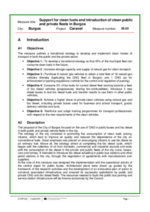Support for clean fuel and clean public and private fleets
Summary
This measure was implemented to support the move towards a municipal transport fleet in which 45 percent of the vehicles ran on cleaner fuels.
Implementing sustainable mobility
An ambitious strategy was put forward by the city council in February 2005 to change public transportation in the city and to set a good example by using only biofuelled vehicles. The idea was extend to waste collection and emergency vehicles, and buses were also fitted with facilities for disabled passengers and information screens.
By July 2007, eight new buses running on compressed natural gas (CNG) had been acquired by the council, as well as 27 vehicles capable of running on 100 percent biodiesel. A fuel station was built offering biofuel and CNG facilities.
At the same time, a strategy for collecting used cooking oil was developed and collection points were established around the city. An awareness-raising campaign was organised using television, radio and print media, encouraging citizens to recycle used oil.
A second awareness-raising campaign promoted good habits in relation to bus use (e.g. not parking at bus stops, letting buses pull out, giving up seats for older people).
Progress
Following the construction of a bus depot and installations for CNG and biofuels, the first clean-fuel vehicles were delivered, including public transport buses and a police vehicle running on CNG. Biodiesel vehicles were also introduced for tests in relation to consumption and performance.
A large-scale campaign was organised to promote biodiesel: stickers were placed on all city buses informing the public that the bus was running on biodiesel. Biodiesel was introduced at four petrol stations in the city.
A programme was then developed to collect used cooking oil and supermarkets and recycling points. The related public information campaign also involved the distribution of bins to make the collection and recycling of used oil easier.
Outcomes
By 2009, 27 new 100-percent diesel buses had been added to the fleet, and four new petrol stations were providing biodiesel. The city received two prizes for its efforts. One of the prizes was awarded by Ministry of Industry in recognition of the city council’s efforts to promote non-motorised modes of transport, renew public transportation fleets, and regulate traffic access to particular areas of the city centre. A second was awarded by the Technical Association for the Management of Resources for the efforts made to collect used cooking oil to obtain biodiesel (television campaigns, collection points); the promotion of biodiesel use; incentives to install biodiesel pumps at three private petrol stations; and the use of 100 percent biofuels in the municipal fleet.
Average emission levels from the municipal fleet fell: by 1.42 g/km in the case of CO2; by 15.85 g/km in the case of NOx; and by 0.61 g/km in the case of particulate matter. The public transport fleet was modernised, the average age of the vehicles falling to 2.5 years, and passenger numbers rose by 7 percent.









